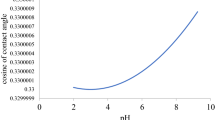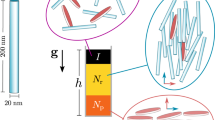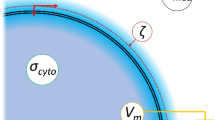Abstract
GHOSH and Rakshit1 have measured the ζ-potentials of a titanic oxide sol in the presence of equicoagulating concentrations of electrolytes. An attempt has been made here to calculate the ζ-potentials of the colloid particles of a titanic oxide sol at flocculating concentrations of electrolytes from an analysis of the nature of the curves of total potential energy of interaction of two spherical colloid particles, and to compare these calculated values with those obtained by Ghosh and Rakshit by electro-osmotic measurements.
This is a preview of subscription content, access via your institution
Access options
Subscribe to this journal
Receive 51 print issues and online access
$199.00 per year
only $3.90 per issue
Buy this article
- Purchase on Springer Link
- Instant access to full article PDF
Prices may be subject to local taxes which are calculated during checkout
Similar content being viewed by others
References
Ghosh and Rakshit, Sci. Culture, 18, 498 (1953).
Derjaguin, Trans. Farad. Soc., 35, 203 (1940).
Hamaker, Physica, 1058 (1937).
Verwey and Overbeek, “Theory of the Stability of Lyophobic Colloids”, p. 108 (Elsevier. Amsterdam, 1948).
Author information
Authors and Affiliations
Rights and permissions
About this article
Cite this article
CHOUDHURY, B. Experimental Test of Verwey and Overbeek's Theory. Nature 185, 308–309 (1960). https://doi.org/10.1038/185308a0
Issue Date:
DOI: https://doi.org/10.1038/185308a0
This article is cited by
-
Selective coagulation in quartz-hematite and quartz-rutile suspensions
Colloid and Polymer Science (1974)
Comments
By submitting a comment you agree to abide by our Terms and Community Guidelines. If you find something abusive or that does not comply with our terms or guidelines please flag it as inappropriate.



